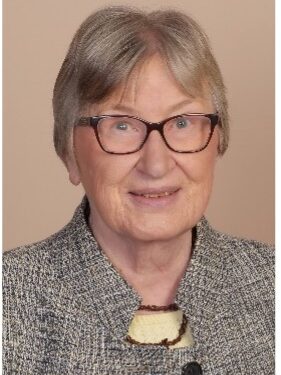Committee Members
Committee on Reducing Diet-Related Chronic Disease
Responsive Agriculture Study
The Committee on Reducing Diet-Related Chronic Disease considers food environments that support human health and the complexity of the diet-disease relationship, appreciating the biological variability among individuals in the diet-disease relationship – one size does not fit all.
Committee Chair

catherine woteki
Catherine Woteki
Catherine E. Woteki is a visiting Distinguished Institute Professor with the Biocomplexity Institute at the University of Virginia and a Professor of Food Science and Human Nutrition at Iowa State University where she served as Dean of the College of Agriculture from 2002 to 2005. Dr. Woteki is also a member of the President’s Council of Advisors on Science and Technology (PCAST), the sole body of advisors from outside the federal government charged with making science, technology, and innovation policy recommendations to the President and the White House. She was Undersecretary for United States Department of Agriculture’s (USDA) Research, Education, and Economics (REE) mission area, as well as the department’s chief scientist from 2010 to 2016. Her responsibilities included oversight of the four agencies that comprise REE, the Agricultural Research Service, National Institute of Food and Agriculture, Economic Research Service, and National Agricultural Statistics Service, as well as the National Agriculture Library and National Arboretum. She has held other prestigious positions, including Deputy Associate Director for Science in the White House Office of Science and Technology Policy (OSTP) from 1994 to 1996. At OSTP, she co-authored the Clinton Administration’s policy statement, Science in the National Interest. She also served as the first Under Secretary of Agriculture for Food Safety during the Clinton Administration, 1997-2001. Dr. Woteki was director of the Food and Nutrition Board of the Institute of Medicine at the National Academy of Sciences from 1990 to 1993. During her tenure as director of the Food and Nutrition Board, she had direct responsibility for 27 studies and co-edited a nutrition book entitled Eat for Life, which became a Book-of-the-Month-Club selection. She has also held positions in the National Center for Health Statistics from 1983 to 1990 and the Human Nutrition Information Service at USDA from 1981 to 1983. Dr. Woteki is the recipient of many awards for her contributions to science and society and was inducted into the National Institute of Food and Agriculture, USDA, Hall of Fame in 2017. She received her PhD in Human Nutrition from the Virginia Polytechnic Institute and State University.
IHA Associate Director

Regan Bailey
Regan Bailey – Task Force Member
Regan Bailey is the Associate Director of Precision Nutrition for the Institute for Advancing Health Through Agriculture and a Professor of Nutrition at Texas A&M University. She previously served as a Professor of Nutrition Science at Purdue University, and as a nutritional epidemiologist and director of career development at the National Institutes of Health, Office of Dietary Supplements. Her research focuses on improving the methods of measuring nutritional status to optimize health. Together with her team, she developed the first models combining nutrients from foods and dietary supplements to estimate total usual dietary intakes and her work was used to inform the calcium and vitamin D Dietary Reference Intakes, and the National Academy reference values. Dr. Bailey served on the 2020 Dietary Guidelines Advisory Committee and as chair of the Data Analysis and Food Pattern Modeling Subcommittee and was a member of the 2021 Committee on Scanning for New Evidence on Riboflavin to Support a Dietary Reference Intake Review for the National Academy of Medicine. She recently was appointed to serve on the American Heart Association’s Council on Lifestyle and Cardiometabolic Health Nutrition Committee.Dr. Bailey is a registered dietitian who completed a dietetic internship and has a master’s degree in food and nutrition from Indiana University of Pennsylvania. Dr. Bailey received her doctorate in nutrition science from Pennsylvania State University and completed a Master of Public Health at the Bloomberg School of Public Health at Johns Hopkins University.
Committee Members

Jamy Ard
Jamy Ard
Jamy Ard is Vice Dean for Clinical Research, Professor in the Department of Epidemiology and Prevention in the Division of Public Health Sciences, and Co-Director of the Weight Management Center at Wake Forest University School of Medicine in Winston-Salem, NC. In October 2021, Dr. Ard was elected as a member to the National Academy of Medicine. Election to the Academy is considered one of the highest honors in the fields of health and medicine and recognizes individuals who have demonstrated outstanding professional achievement and commitment to service. Dr. Ard conducts research in clinical strategies to treat obesity and associated risk-factor modification. He also focuses on health disparities and ways to better engage African Americans in effective obesity treatment and research programs. Dr. Ard is a graduate of Duke University Medical Center in Durham, NC, where he earned his medical degree, and he also holds a BS in Biology from Morehouse College in Atlanta, GA.

Cindy davis
Cindy Davis
Cindy Davis serves as National Program Leader for the program in Human Nutrition conducted by the USDA-Agricultural Research Service where she helps direct the scientific program for six Human Nutrition Research Centers. Prior to joining USDA, she was the Director of Grants and Extramural Activities in the Office of Dietary Supplements (ODS) where she actively engaged and encouraged partnerships with other NIH Institutes and Centers to develop a portfolio that advances both nutritional and botanical dietary supplement research for optimizing public health. She is also actively involved in a number of government working groups focused on the microbiome including being a co-founder and co-chair of the Joint Agency Microbiome (NIH, FDA, NIST and USDA) working group. Before coming to ODS, she was a Program Director in the Nutritional Sciences Research Group at the National Cancer Institute. In 2000, she received a Presidential Early Career Award for Scientists and Engineers and was named the USDA Early Career Scientist. She is a supplement editor for the Journal of Nutrition and a member of the editorial board for Advances in Nutrition. Cindy received her PhD in Nutrition with a minor in Human Cancer Biology from the University of Wisconsin- Madison and completed her postdoctoral training at the Laboratory of Experimental Carcinogenesis at the National Cancer Institute.

terry hartman
Terry Hartman
Terry Hartman is a Professor of Epidemiology in the Department of Epidemiology at Rollins School of Public Health, Emory University. Her research is focused on the role of diet and nutrition in the etiology and prevention of chronic diseases—especially cancer—and the development and application of improved dietary assessment methods in chronic disease research. Prior to relocating to Emory in 2013, Dr. Hartman was Professor of Nutrition and Director of the Diet Assessment Center at The Pennsylvania State University. As a nutrition epidemiologist, she has nearly 30 years of experience exploring associations between nutritional exposures and chronic disease outcomes and has designed and collaborated on multi-disciplinary trials to work toward understanding the mechanisms for these associations. In 2017, Dr. Hartman was named to the MilliPub Club, which recognizes current Emory faculty who have published one or more individual papers throughout their careers that have garnered more than 1,000 citations. Dr. Hartman is a member of the Cancer Prevention and Control Research Program at The Winship Cancer Institute. Dr. Hartman earned her PhD from the University of Minnesota with a focus in Nutritional Epidemiology and completed her MS in Nutrition and dietetic internship at Texas A&M University. She was then selected as a Cancer Prevention Fellow by the National Cancer Institute and completed her MPH at the Harvard School of Public Health.

Wendy reinhardt kapsak
Wendy Reinhardt Kapsak
Wendy Reinhardt Kapsak is President and CEO of the International Food Information Council (IFIC), a nonprofit education organization focused on effectively communicating science-based information about sustainable food systems, with an emphasis on food safety and nutrition. Prior to joining IFIC, Wendy served as the President and CEO of the Produce for Better Health Foundation (PBH) where she guided the Foundation’s efforts with hundreds of public and private partners to advance fruit and vegetable consumption for happier, healthier lives. Under her leadership and through a two-year transformation, the organization launched the Have A Plant® Movement in 2019, which today, inspires millions of consumers to eat and enjoy more fruits and vegetables each and every day. From 2012 to 2016, Reinhardt Kapsak held multiple leadership positions in the Food, Nutrition & Health Partnerships and Corporate Engagement verticals in what is now collectively known as Bayer Crop Science. Wendy returned to IFIC after a previous tenure from 2000–2012, including service as Senior Director, Health & Wellness where she directed food and nutrition communication strategies, including consumer research, opinion leader and media outreach, as well as publications and partnerships, for multiple food, agriculture, and nutrition issues. Wendy earned a BS and MS in Nutrition and Exercise Science from the University of Missouri, Columbia and James Madison University, respectively. She completed her dietetic internship at Yale-New Haven Hospital — an affiliate of the Yale University School of Medicine.

John kirwan
John Kirwan
John Kirwan is the Executive Director of Pennington Biomedical Research Center and an internationally renowned obesity, diabetes, and nutrition scientist whose professional expertise includes over 30 years of research, teaching and service in the obesity and diabetes fields. His exceptional record of excellence in diabetes-related research, including the discovery that type 2 diabetes can often be cured by surgical alteration of the intestines and stomach, made him the perfect choice for taking the lead at Pennington Biomedical in January 2018. He is currently Principal Investigator or Co-Investigator on 10 U.S. National Institutes of Health (NIH) grants, and to date, he has generated more than $50 million in research funding. He has published more than 200 scientific papers related to diabetes and metabolism in prestigious peer-reviewed journals, including the New England Journal of Medicine, JAMA, Diabetes and Diabetes Care. Most recently Dr. Kirwan served as the director of the Metabolic Translational Research Center and professor of molecular medicine at the Cleveland Clinic in Cleveland, Ohio, and has also held faculty appointments at Case Western Reserve University as a professor of physiology and of nutrition. Kirwan received his clinical physiology training at Washington University School of Medicine in St. Louis, MO.; his PhD in Human Bioenergetics at Ball State University, Muncie, IN.; his MS in Exercise Biochemistry from the University of Massachusetts, Amherst, MA.; and his BA from the University of Limerick, Ireland.

kevin klatt
Kevin Klatt
Kevin C. Klatt is an Assistant Research Scientist and Instructor in the Department of Nutrition Sciences and Toxicology at the University of California, Berkeley. Dr. Klatt’s research aims to better characterize nutrient metabolism, signaling and requirements using in vitro and animal model systems, as well as human intervention and controlled feeding trials. Dr. Klatt’s current research focus aims to better characterize 1 carbon and lipid metabolism interactions and their relevance for both whole body physiology (with a special emphasis on pregnancy) and nutrient signaling through the generation of nuclear receptor ligands. In addition to research, Dr. Klatt teaches undergraduate and graduate level courses in nutrient metabolism at the University of California, Berkeley and is an Associate Editor at the American Journal of Clinical Nutrition. Kevin received his PhD in Molecular Nutrition from Cornell University and completed his dietetic internship at the National Institutes of Health Clinical Center. He completed postdoctoral training at the Children’s Nutrition Research Center at the Baylor College of Medicine prior to joining the University of California, Berkeley.

Kristina Petersen
Kristina Petersen
Kristina Petersen is an Associate Professor in the Department of Nutritional Sciences at Pennsylvania State University. She is a Fellow of the American Heart Association and a member of their Nutrition Committee. Dr. Petersen is also Director of the Diet and Cardiometabolic Health Lab at Pennsylvania State University, which studies dietary interventions to delay and prevent the onset of cardiometabolic diseases. The lab conducts human clinical trials to examine the effect of individual foods, bioactives, and dietary patterns on risk factors for cardiometabolic diseases while developing strategies to improve diet quality. She has published >100 articles and 9 chapters and as a Principal Investigator or Co-Primary Investigator has obtained approximately $4 million in funding for research projects aiming to enhance health and reduce the burden of diet-related disease. Dr. Petersen has a Bachelor of Nutrition and Dietetics from Flinders University, Australia and a PhD in Nutrition from the University of South Australia. She completed postdoctoral training at The George Institute for Global Health in Australia and Pennsylvania State University.

Pamela Schwartz
Pamela Schwartz
Pamela Schwartz is Executive Director of community health for Kaiser Permanente. She leads the organization’s national food-security strategy and other social health priorities, including ensuring that social health interventions are integrated seamlessly into care and services provided to Medicaid members and across all lines of business. Schwartz and her team created the organization’s earliest outreach campaigns to help eligible members enroll in public-benefit programs. With deep experience designing, testing and scaling social health interventions and collaborating across sectors to inform and shape public policy, she oversees Kaiser Permanente’s $50 million Food is Medicine commitment, made alongside its role in the White House Conference on Hunger, Nutrition, and Health. As an early advocate in the Food is Medicine movement, she has helped establish the evidence base and business case for addressing food and nutrition insecurity at Kaiser Permanente and in health care systems across America. Schwartz has over 25 years’ experience in community health strategy and evaluation. She serves on many advisory committees and expert panels and has authored several journal articles. She is currently on faculty at the Kaiser Permanente Bernard J. Tyson School of Medicine. Pam has a master’s degree in public health and completed Kaiser Permanente’s Executive Leadership Program at Harvard Business School.

Kartik shankar
Kartik Shankar
Kartik Shankar is currently a tenured Professor in the Section of Nutrition, Department of Pediatrics at the University of Colorado Anschutz Medical Campus as well as the Associate Director for the Molecular, Cellular & Analytical Core of the Colorado NORC and co-director of basic research for the LEAD Center focused on epidemiology of obesity and diabetes. Previously, he served as the Associate Director of Basic Research at the USDA- Arkansas Children’s Nutrition Center in Little Rock, Arkansas. For nearly two decades, he has led an extramurally funded research program in obesity and life-stage nutrition research. Dr. Shankar has broad expertise in research related to obesity, nutrition, pregnancy, and developmental programming. His research experience has encompassed a wide range of biology, spanning the spectrum from cell, whole-animal and molecular methodologies to clinical studies in women and children. His mechanistic research has focused on the role of transcriptomic, epigenetic and microbiome mediated mechanisms in non-communicable diseases. Dr. Shankar has served on a number of advisory and peer-review committees for the USDA and NIH (including as standing member with CSR) focused on nutrition, obesity and diabetes. Shankar’s research has resulted in the publication of 150 peer-reviewed scientific articles, 5 book chapters and other invited publications. Dr. Shankar received his PhD in Toxicology from the University of Louisiana at Monroe in 2003 and completed his post-doctoral training in pregnancy and nutrition at the Arkansas Children’s Nutrition Center in 2005.

John sievenpiper
John Sievenpiper
John Sievenpiper is a Clinician Scientist who holds appointments as a Professor in the Departments of Nutritional Sciences and Medicine and the Lifestyle Medicine Lead in the MD Program at the University of Toronto. He is also a Staff Physician in the Division of Endocrinology & Metabolism, Lead of the Toronto 3D Knowledge Synthesis and Clinical Trials Unit, and Scientist in the La Ka Shing Knowledge Institute at St. Michael’s Hospital. He has established an internationally recognized research program focused on using randomized controlled trials and epidemiological approaches to address questions of clinical and public health importance in relation to diet and cardiometabolic disease prevention with a particular interest in the role of sugars, carbohydrate quality, and plant-based dietary patterns. He is directly involved in knowledge translation with appointments to the nutrition guidelines’ committees of Diabetes Canada, European Association for the study of Diabetes (EASD), Canadian Cardiovascular Society (CCS), and Obesity Canada. He is the recipient of numerous awards including an Insulin 100 Emerging Leader Award, Khursheed Jeejeebhoy Award, CNS Young Investigator Award, PSI Foundation Graham Farquharson Knowledge Translation Fellowship, Diabetes Canada Clinician Scientist Award, Banting & Best Diabetes Centre Sun Life Financial New Investigator Award, and CIHR-INMD/CNS–New Investigator Partnership Prize and has authored over 250 scientific papers and 17 book chapters. Dr. Sievenpiper completed his MSc, PhD and Postdoctoral Fellowship training in the Department of Nutritional Sciences at the University of Toronto. He completed his MD at St. Matthew’s University followed by Residency training in Medical Biochemistry at McMaster University leading to his certification as a Fellow of the Royal College of Physicians of Canada (FRCPC).

Elizabeth yetley
Elizabeth Yetley
Beth Yetley is a retired government scientist. Her career spans more than 28 years of government service including 24 years at the Food and Drug Administration culminating with her appointment as lead scientist in nutrition. From 2004 until her retirement, she was a senior nutrition research scientist with the National Institutes of Health, Office of Dietary Supplements. Her leadership activities in the field of nutrition public health policy have been considerable and impactful. She has been responsible for national food fortification programs, use of national nutrition monitoring and surveillance systems to support nutrition and food safety health policies, nutrition labeling including health claims to reduce sodium intakes, infant formula and medical food reviews and regulatory oversight, dietary supplement regulation, and the use of nutrient-related reference values in public health policy formulation. She has received more than 75 honors, commendations, and letters of recognition for her service and has served as a scientific representative for the U.S. government on more than 50 associations, panels, and committees. She has authored or coauthored approximately 100 scientific and peer-reviewed publications. Dr. Yetley received her PhD in Nutrition with a minor in Biochemistry and Physiology from Iowa State University.